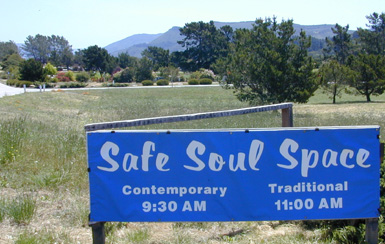
In the interests of charity, I won't tell you where I found the sign above. Suffice to say, the church whose presence it announced was 1) Christian and 2) not apparently connected to any particular denomination. Let's see what they might have meant . . .
Contemporary . . . Perhaps this is the "nurturing parent" service in which attendees are sung lullabies and encouraged to touch their bliss? I intuit something very touchy-feely and impossible to pin down as to meaning.
Traditional . . . is simpler to envision; it is the service for those seeking patriarchal authority. God has laid down the rules and don't ask questions!
Neither picture excites me. And both seem to imply something human beings just don't get -- across the board assurance we are safe.
I'm reminded of the terrifed suburbanites I wrote about last week. We are at present a very anxious people.
The demand for "safe space" turns up frequently in US life. Sadly, I believe the quest for "safe space" is often an unintended residue of a legitimate effort by 20th century feminists to make explicit, and then change, the unexpressed rules that control the behavior of groups. Women became all too aware that men often dominated, sometimes by sheer aggressiveness, sometimes by knowing the rules better. We wanted bullying outlawed and the rules made clear -- so we insisted on better "process." Nice people of both genders became very process conscious; by and large that was a development that helped more people take part in community life.
But some people, usually those less experienced in group interactions, therefore often women, wanted "improved process" to include a promise that no one would attack them for expressing themselves. And sometimes "attack" was taken to mean what many would think was "disagreement." So we got process rules, such as "no cross talk" and "listen actively but don't respond" that may protect speakers but stifle conversation.
Process more appropriate to psychotherapy than to honest individual and group interaction has become embedded in many people's expectations.
"Safe soul space" is the reverse of what I expect in a church, or a political group, or even any significant set of friends. If our souls are not challenged, not at risk of change and growth, what's the point? Safe space sounds like dead space to me. Too often we have forgotten that a worthwhile life requires courage.
No comments:
Post a Comment